Project Management Methodologies: PRINCE2, PMBOK, and PLC
VerifiedAdded on 2023/06/15
|6
|1308
|372
Report
AI Summary
This report provides an overview of project management methodologies, focusing on PRINCE2 and PMBOK. It discusses the role of project methodologies in planning, designing, and implementing project objectives, highlighting their importance in completing projects within budget and time constraints. The report details PRINCE2 as a procedure-based methodology and contrasts it with PMBOK, a standard or guideline for project management. Similarities and differences between the two are outlined, including their approaches to knowledge areas, processes, and focus. Furthermore, the report explores how these methodologies relate to the project life cycle (PLC), covering phases such as initiation, planning, execution, monitoring, and closing, emphasizing the practical application of these methodologies in managing and executing projects effectively. Desklib offers a wealth of similar resources for students.
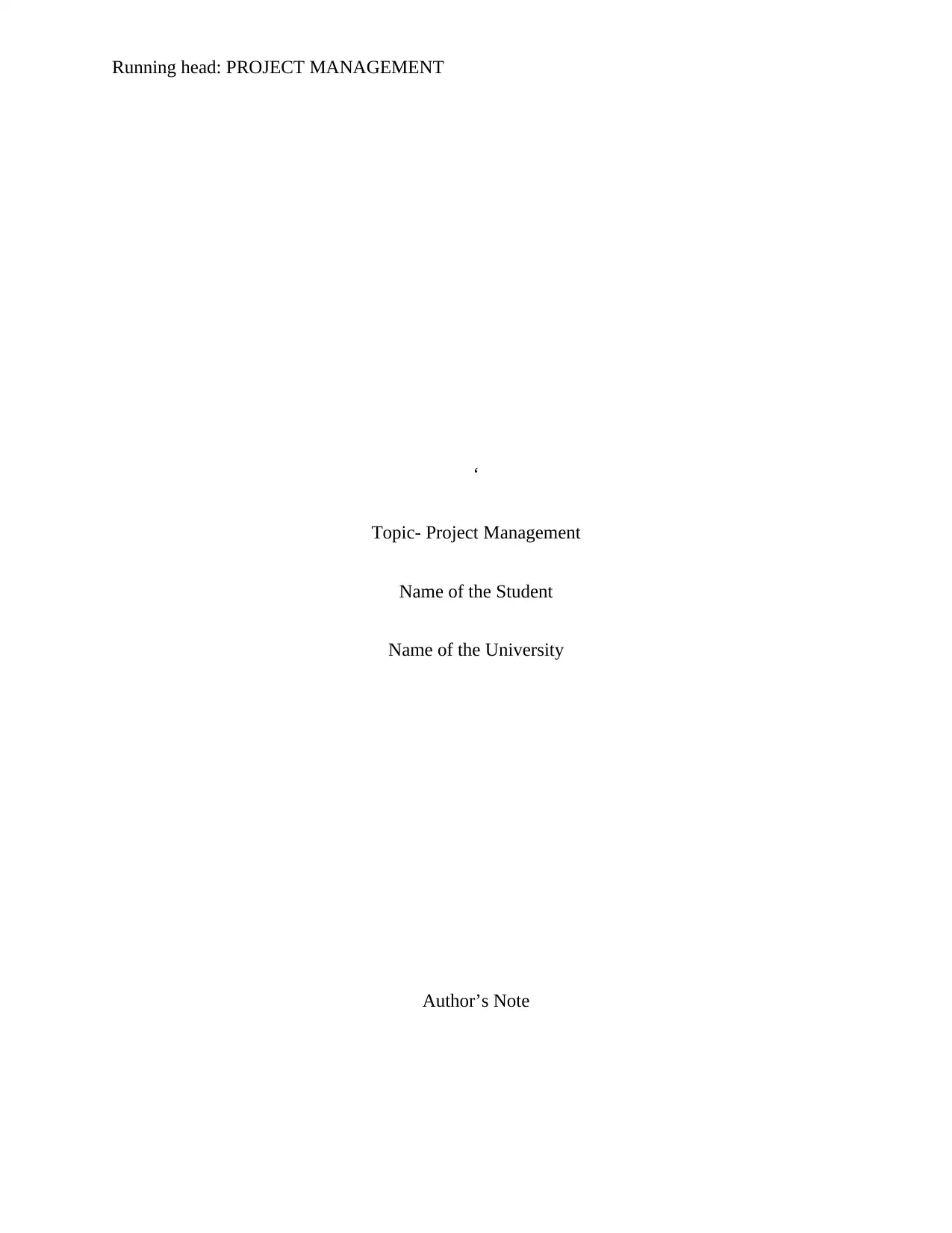
Running head: PROJECT MANAGEMENT
‘
Topic- Project Management
Name of the Student
Name of the University
Author’s Note
‘
Topic- Project Management
Name of the Student
Name of the University
Author’s Note
Paraphrase This Document
Need a fresh take? Get an instant paraphrase of this document with our AI Paraphraser
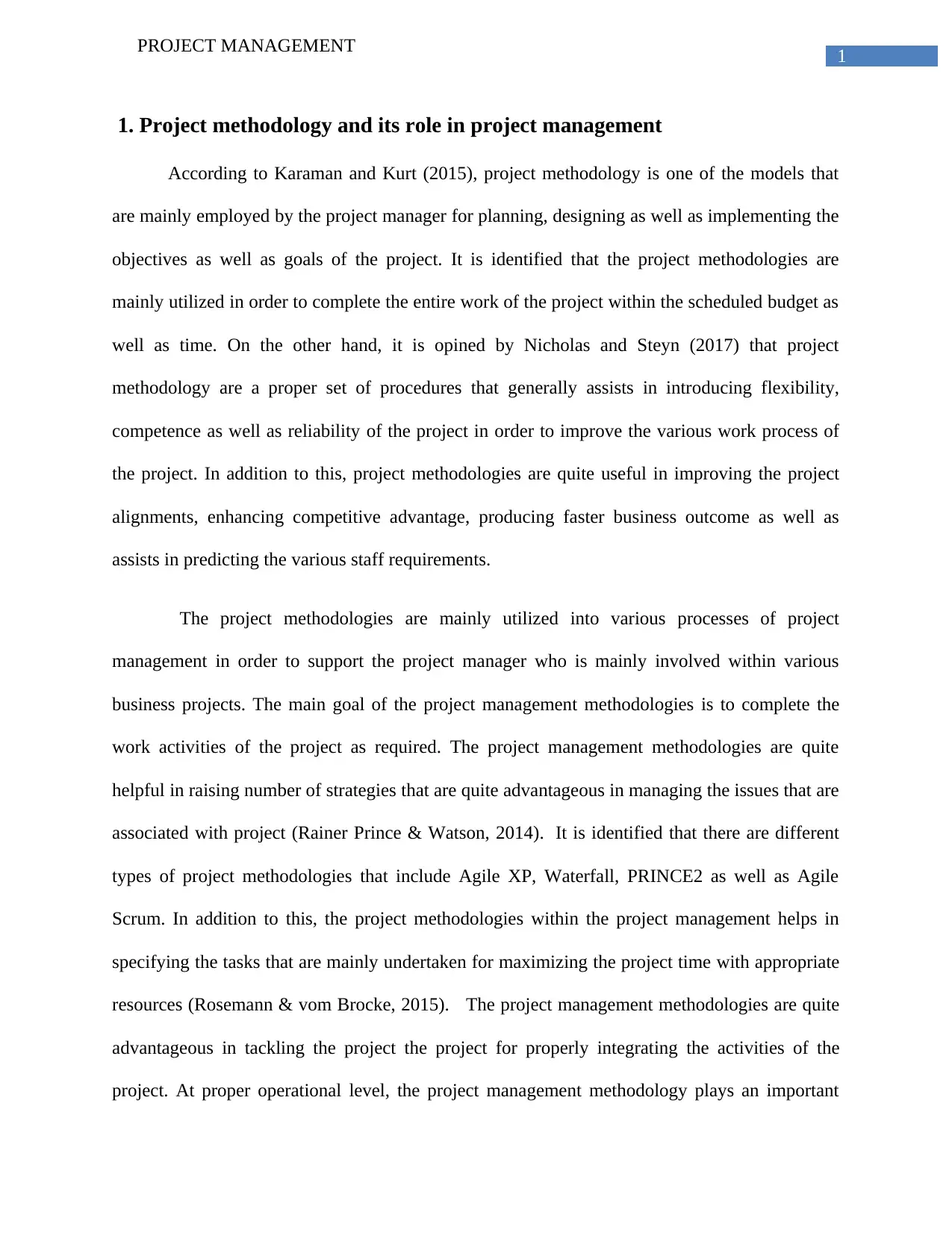
1
PROJECT MANAGEMENT
1. Project methodology and its role in project management
According to Karaman and Kurt (2015), project methodology is one of the models that
are mainly employed by the project manager for planning, designing as well as implementing the
objectives as well as goals of the project. It is identified that the project methodologies are
mainly utilized in order to complete the entire work of the project within the scheduled budget as
well as time. On the other hand, it is opined by Nicholas and Steyn (2017) that project
methodology are a proper set of procedures that generally assists in introducing flexibility,
competence as well as reliability of the project in order to improve the various work process of
the project. In addition to this, project methodologies are quite useful in improving the project
alignments, enhancing competitive advantage, producing faster business outcome as well as
assists in predicting the various staff requirements.
The project methodologies are mainly utilized into various processes of project
management in order to support the project manager who is mainly involved within various
business projects. The main goal of the project management methodologies is to complete the
work activities of the project as required. The project management methodologies are quite
helpful in raising number of strategies that are quite advantageous in managing the issues that are
associated with project (Rainer Prince & Watson, 2014). It is identified that there are different
types of project methodologies that include Agile XP, Waterfall, PRINCE2 as well as Agile
Scrum. In addition to this, the project methodologies within the project management helps in
specifying the tasks that are mainly undertaken for maximizing the project time with appropriate
resources (Rosemann & vom Brocke, 2015). The project management methodologies are quite
advantageous in tackling the project the project for properly integrating the activities of the
project. At proper operational level, the project management methodology plays an important
PROJECT MANAGEMENT
1. Project methodology and its role in project management
According to Karaman and Kurt (2015), project methodology is one of the models that
are mainly employed by the project manager for planning, designing as well as implementing the
objectives as well as goals of the project. It is identified that the project methodologies are
mainly utilized in order to complete the entire work of the project within the scheduled budget as
well as time. On the other hand, it is opined by Nicholas and Steyn (2017) that project
methodology are a proper set of procedures that generally assists in introducing flexibility,
competence as well as reliability of the project in order to improve the various work process of
the project. In addition to this, project methodologies are quite useful in improving the project
alignments, enhancing competitive advantage, producing faster business outcome as well as
assists in predicting the various staff requirements.
The project methodologies are mainly utilized into various processes of project
management in order to support the project manager who is mainly involved within various
business projects. The main goal of the project management methodologies is to complete the
work activities of the project as required. The project management methodologies are quite
helpful in raising number of strategies that are quite advantageous in managing the issues that are
associated with project (Rainer Prince & Watson, 2014). It is identified that there are different
types of project methodologies that include Agile XP, Waterfall, PRINCE2 as well as Agile
Scrum. In addition to this, the project methodologies within the project management helps in
specifying the tasks that are mainly undertaken for maximizing the project time with appropriate
resources (Rosemann & vom Brocke, 2015). The project management methodologies are quite
advantageous in tackling the project the project for properly integrating the activities of the
project. At proper operational level, the project management methodology plays an important
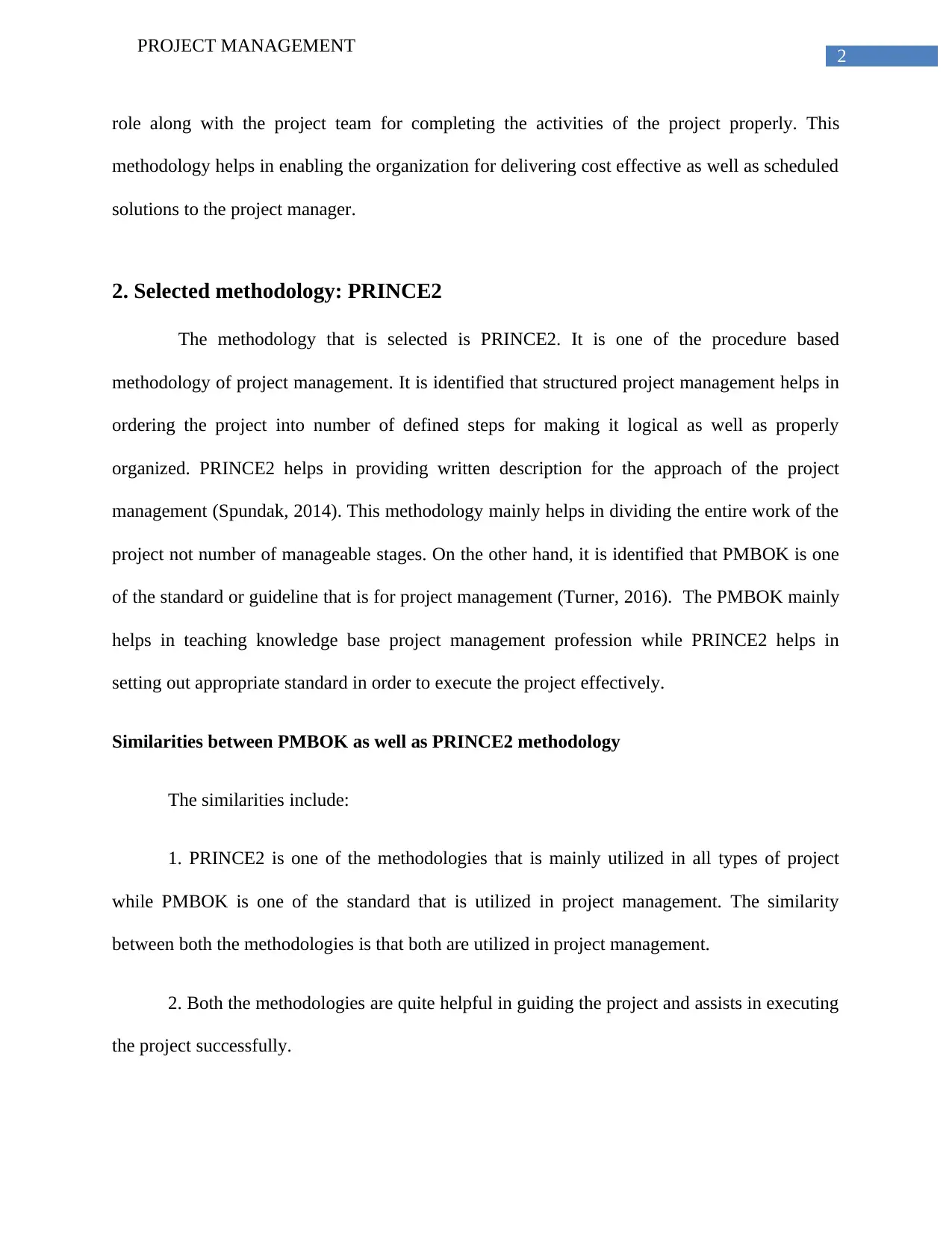
2
PROJECT MANAGEMENT
role along with the project team for completing the activities of the project properly. This
methodology helps in enabling the organization for delivering cost effective as well as scheduled
solutions to the project manager.
2. Selected methodology: PRINCE2
The methodology that is selected is PRINCE2. It is one of the procedure based
methodology of project management. It is identified that structured project management helps in
ordering the project into number of defined steps for making it logical as well as properly
organized. PRINCE2 helps in providing written description for the approach of the project
management (Spundak, 2014). This methodology mainly helps in dividing the entire work of the
project not number of manageable stages. On the other hand, it is identified that PMBOK is one
of the standard or guideline that is for project management (Turner, 2016). The PMBOK mainly
helps in teaching knowledge base project management profession while PRINCE2 helps in
setting out appropriate standard in order to execute the project effectively.
Similarities between PMBOK as well as PRINCE2 methodology
The similarities include:
1. PRINCE2 is one of the methodologies that is mainly utilized in all types of project
while PMBOK is one of the standard that is utilized in project management. The similarity
between both the methodologies is that both are utilized in project management.
2. Both the methodologies are quite helpful in guiding the project and assists in executing
the project successfully.
PROJECT MANAGEMENT
role along with the project team for completing the activities of the project properly. This
methodology helps in enabling the organization for delivering cost effective as well as scheduled
solutions to the project manager.
2. Selected methodology: PRINCE2
The methodology that is selected is PRINCE2. It is one of the procedure based
methodology of project management. It is identified that structured project management helps in
ordering the project into number of defined steps for making it logical as well as properly
organized. PRINCE2 helps in providing written description for the approach of the project
management (Spundak, 2014). This methodology mainly helps in dividing the entire work of the
project not number of manageable stages. On the other hand, it is identified that PMBOK is one
of the standard or guideline that is for project management (Turner, 2016). The PMBOK mainly
helps in teaching knowledge base project management profession while PRINCE2 helps in
setting out appropriate standard in order to execute the project effectively.
Similarities between PMBOK as well as PRINCE2 methodology
The similarities include:
1. PRINCE2 is one of the methodologies that is mainly utilized in all types of project
while PMBOK is one of the standard that is utilized in project management. The similarity
between both the methodologies is that both are utilized in project management.
2. Both the methodologies are quite helpful in guiding the project and assists in executing
the project successfully.
⊘ This is a preview!⊘
Do you want full access?
Subscribe today to unlock all pages.

Trusted by 1+ million students worldwide
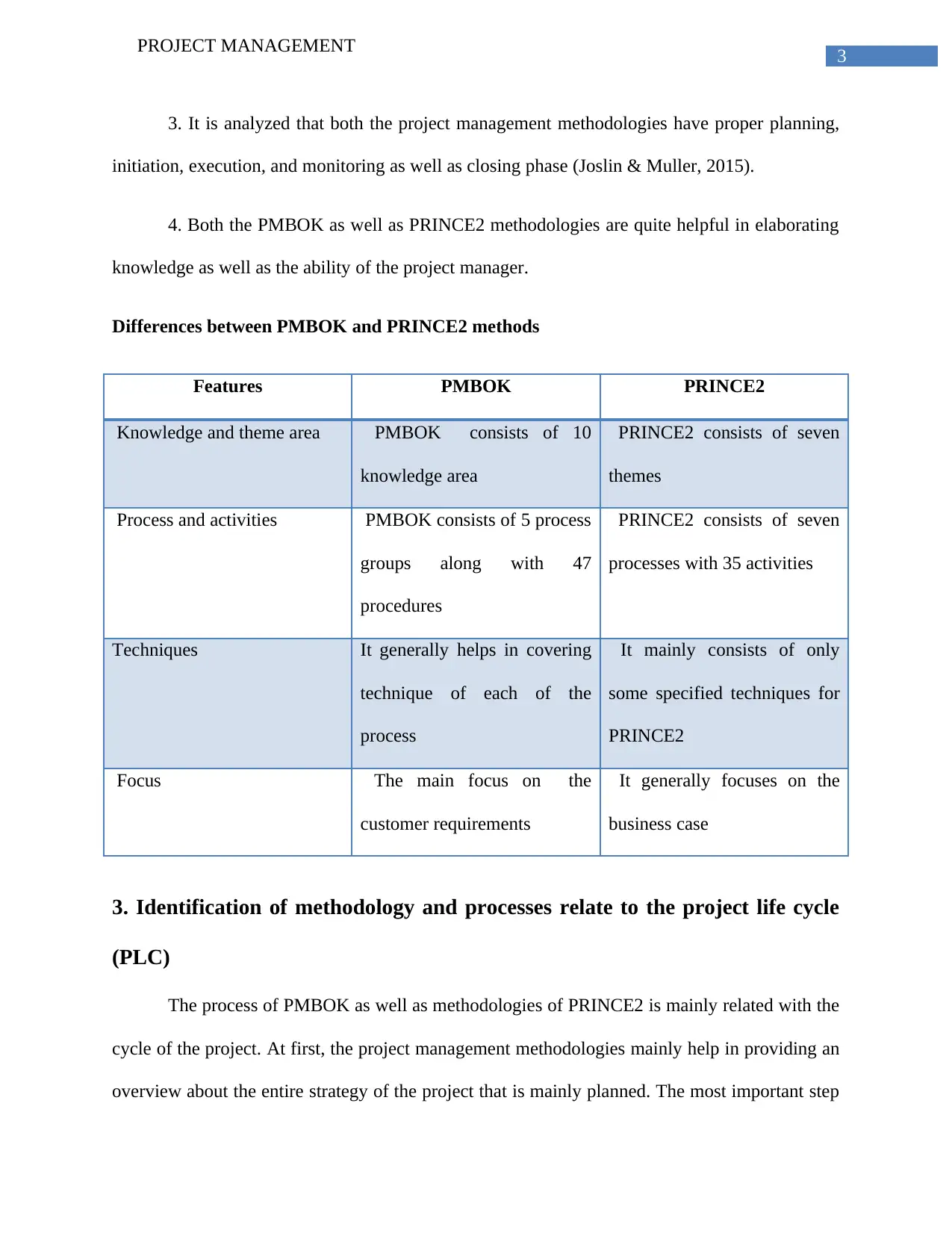
3
PROJECT MANAGEMENT
3. It is analyzed that both the project management methodologies have proper planning,
initiation, execution, and monitoring as well as closing phase (Joslin & Muller, 2015).
4. Both the PMBOK as well as PRINCE2 methodologies are quite helpful in elaborating
knowledge as well as the ability of the project manager.
Differences between PMBOK and PRINCE2 methods
Features PMBOK PRINCE2
Knowledge and theme area PMBOK consists of 10
knowledge area
PRINCE2 consists of seven
themes
Process and activities PMBOK consists of 5 process
groups along with 47
procedures
PRINCE2 consists of seven
processes with 35 activities
Techniques It generally helps in covering
technique of each of the
process
It mainly consists of only
some specified techniques for
PRINCE2
Focus The main focus on the
customer requirements
It generally focuses on the
business case
3. Identification of methodology and processes relate to the project life cycle
(PLC)
The process of PMBOK as well as methodologies of PRINCE2 is mainly related with the
cycle of the project. At first, the project management methodologies mainly help in providing an
overview about the entire strategy of the project that is mainly planned. The most important step
PROJECT MANAGEMENT
3. It is analyzed that both the project management methodologies have proper planning,
initiation, execution, and monitoring as well as closing phase (Joslin & Muller, 2015).
4. Both the PMBOK as well as PRINCE2 methodologies are quite helpful in elaborating
knowledge as well as the ability of the project manager.
Differences between PMBOK and PRINCE2 methods
Features PMBOK PRINCE2
Knowledge and theme area PMBOK consists of 10
knowledge area
PRINCE2 consists of seven
themes
Process and activities PMBOK consists of 5 process
groups along with 47
procedures
PRINCE2 consists of seven
processes with 35 activities
Techniques It generally helps in covering
technique of each of the
process
It mainly consists of only
some specified techniques for
PRINCE2
Focus The main focus on the
customer requirements
It generally focuses on the
business case
3. Identification of methodology and processes relate to the project life cycle
(PLC)
The process of PMBOK as well as methodologies of PRINCE2 is mainly related with the
cycle of the project. At first, the project management methodologies mainly help in providing an
overview about the entire strategy of the project that is mainly planned. The most important step
Paraphrase This Document
Need a fresh take? Get an instant paraphrase of this document with our AI Paraphraser
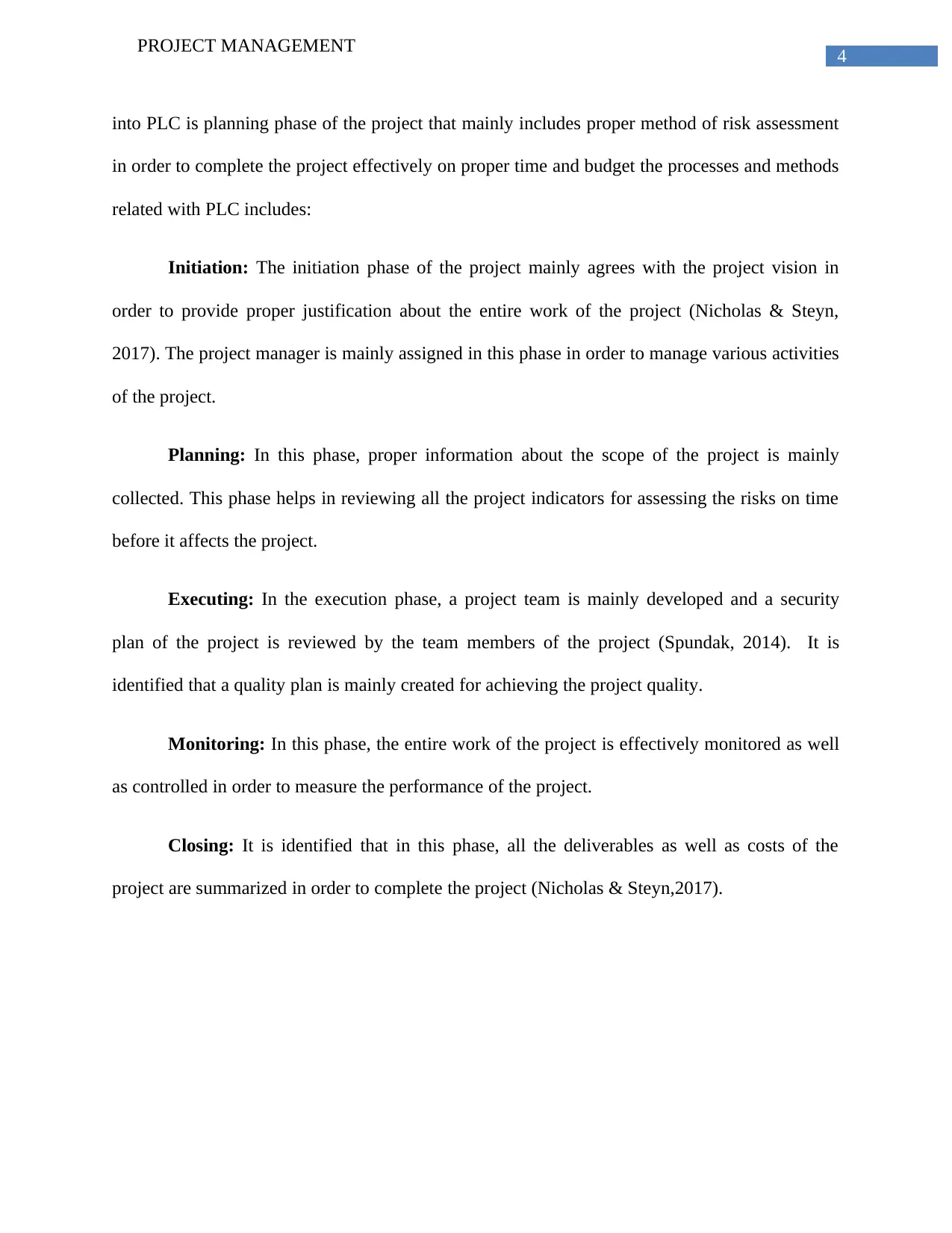
4
PROJECT MANAGEMENT
into PLC is planning phase of the project that mainly includes proper method of risk assessment
in order to complete the project effectively on proper time and budget the processes and methods
related with PLC includes:
Initiation: The initiation phase of the project mainly agrees with the project vision in
order to provide proper justification about the entire work of the project (Nicholas & Steyn,
2017). The project manager is mainly assigned in this phase in order to manage various activities
of the project.
Planning: In this phase, proper information about the scope of the project is mainly
collected. This phase helps in reviewing all the project indicators for assessing the risks on time
before it affects the project.
Executing: In the execution phase, a project team is mainly developed and a security
plan of the project is reviewed by the team members of the project (Spundak, 2014). It is
identified that a quality plan is mainly created for achieving the project quality.
Monitoring: In this phase, the entire work of the project is effectively monitored as well
as controlled in order to measure the performance of the project.
Closing: It is identified that in this phase, all the deliverables as well as costs of the
project are summarized in order to complete the project (Nicholas & Steyn,2017).
PROJECT MANAGEMENT
into PLC is planning phase of the project that mainly includes proper method of risk assessment
in order to complete the project effectively on proper time and budget the processes and methods
related with PLC includes:
Initiation: The initiation phase of the project mainly agrees with the project vision in
order to provide proper justification about the entire work of the project (Nicholas & Steyn,
2017). The project manager is mainly assigned in this phase in order to manage various activities
of the project.
Planning: In this phase, proper information about the scope of the project is mainly
collected. This phase helps in reviewing all the project indicators for assessing the risks on time
before it affects the project.
Executing: In the execution phase, a project team is mainly developed and a security
plan of the project is reviewed by the team members of the project (Spundak, 2014). It is
identified that a quality plan is mainly created for achieving the project quality.
Monitoring: In this phase, the entire work of the project is effectively monitored as well
as controlled in order to measure the performance of the project.
Closing: It is identified that in this phase, all the deliverables as well as costs of the
project are summarized in order to complete the project (Nicholas & Steyn,2017).
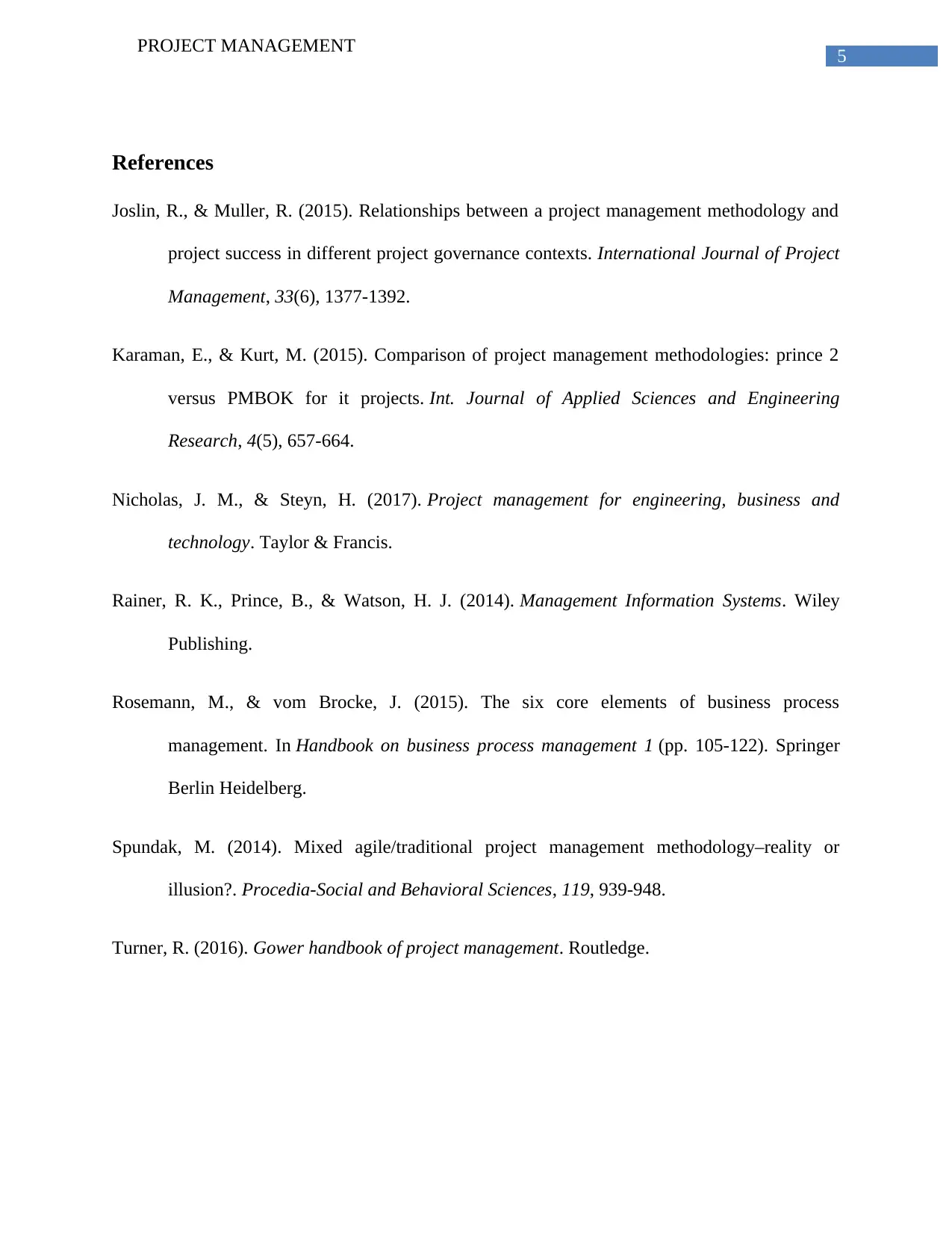
5
PROJECT MANAGEMENT
References
Joslin, R., & Muller, R. (2015). Relationships between a project management methodology and
project success in different project governance contexts. International Journal of Project
Management, 33(6), 1377-1392.
Karaman, E., & Kurt, M. (2015). Comparison of project management methodologies: prince 2
versus PMBOK for it projects. Int. Journal of Applied Sciences and Engineering
Research, 4(5), 657-664.
Nicholas, J. M., & Steyn, H. (2017). Project management for engineering, business and
technology. Taylor & Francis.
Rainer, R. K., Prince, B., & Watson, H. J. (2014). Management Information Systems. Wiley
Publishing.
Rosemann, M., & vom Brocke, J. (2015). The six core elements of business process
management. In Handbook on business process management 1 (pp. 105-122). Springer
Berlin Heidelberg.
Spundak, M. (2014). Mixed agile/traditional project management methodology–reality or
illusion?. Procedia-Social and Behavioral Sciences, 119, 939-948.
Turner, R. (2016). Gower handbook of project management. Routledge.
PROJECT MANAGEMENT
References
Joslin, R., & Muller, R. (2015). Relationships between a project management methodology and
project success in different project governance contexts. International Journal of Project
Management, 33(6), 1377-1392.
Karaman, E., & Kurt, M. (2015). Comparison of project management methodologies: prince 2
versus PMBOK for it projects. Int. Journal of Applied Sciences and Engineering
Research, 4(5), 657-664.
Nicholas, J. M., & Steyn, H. (2017). Project management for engineering, business and
technology. Taylor & Francis.
Rainer, R. K., Prince, B., & Watson, H. J. (2014). Management Information Systems. Wiley
Publishing.
Rosemann, M., & vom Brocke, J. (2015). The six core elements of business process
management. In Handbook on business process management 1 (pp. 105-122). Springer
Berlin Heidelberg.
Spundak, M. (2014). Mixed agile/traditional project management methodology–reality or
illusion?. Procedia-Social and Behavioral Sciences, 119, 939-948.
Turner, R. (2016). Gower handbook of project management. Routledge.
⊘ This is a preview!⊘
Do you want full access?
Subscribe today to unlock all pages.

Trusted by 1+ million students worldwide
1 out of 6
Related Documents
Your All-in-One AI-Powered Toolkit for Academic Success.
+13062052269
info@desklib.com
Available 24*7 on WhatsApp / Email
![[object Object]](/_next/static/media/star-bottom.7253800d.svg)
Unlock your academic potential
Copyright © 2020–2026 A2Z Services. All Rights Reserved. Developed and managed by ZUCOL.





